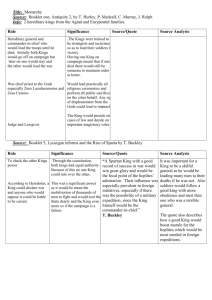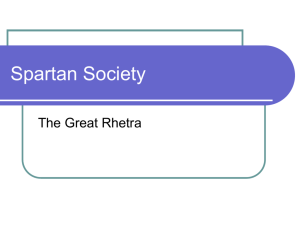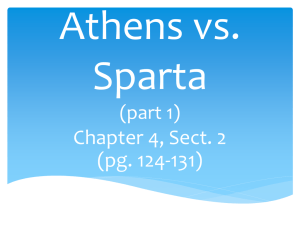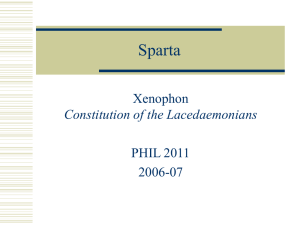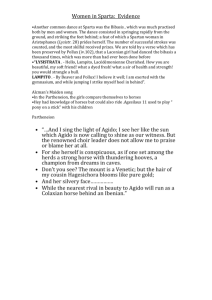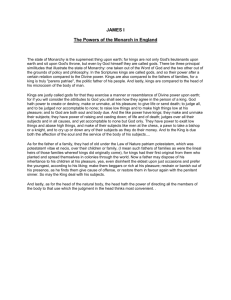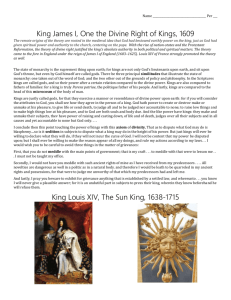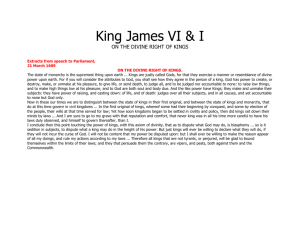2.2&2.3-The role and Privileges of the Spartan Kings.
advertisement
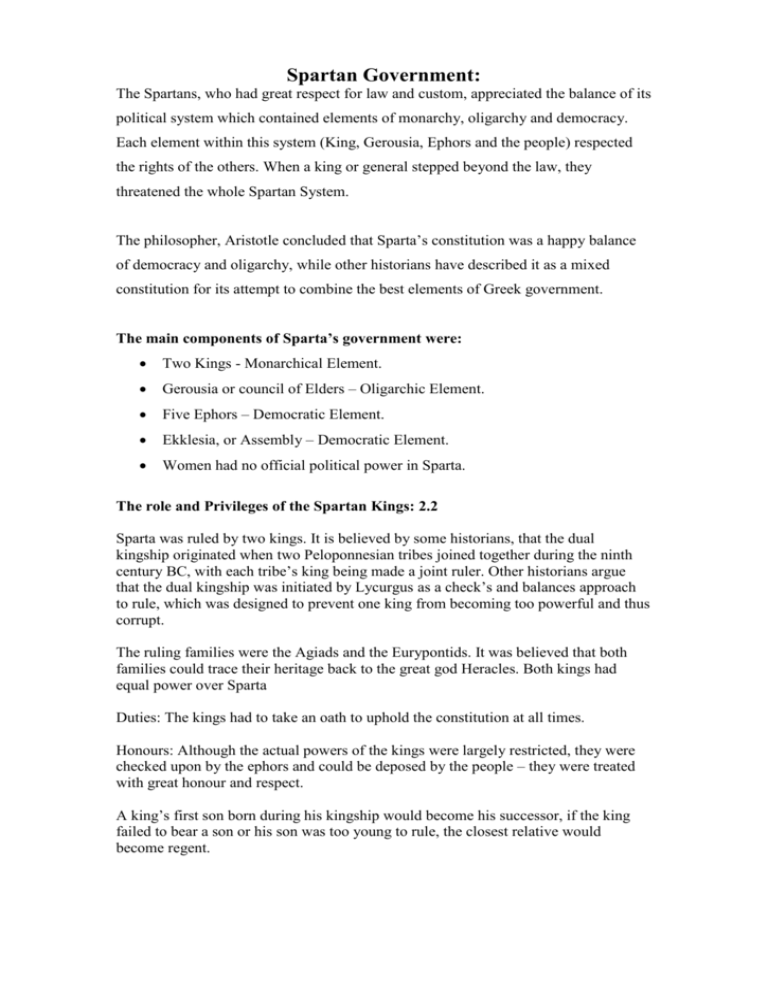
Spartan Government: The Spartans, who had great respect for law and custom, appreciated the balance of its political system which contained elements of monarchy, oligarchy and democracy. Each element within this system (King, Gerousia, Ephors and the people) respected the rights of the others. When a king or general stepped beyond the law, they threatened the whole Spartan System. The philosopher, Aristotle concluded that Sparta’s constitution was a happy balance of democracy and oligarchy, while other historians have described it as a mixed constitution for its attempt to combine the best elements of Greek government. The main components of Sparta’s government were: Two Kings - Monarchical Element. Gerousia or council of Elders – Oligarchic Element. Five Ephors – Democratic Element. Ekklesia, or Assembly – Democratic Element. Women had no official political power in Sparta. The role and Privileges of the Spartan Kings: 2.2 Sparta was ruled by two kings. It is believed by some historians, that the dual kingship originated when two Peloponnesian tribes joined together during the ninth century BC, with each tribe’s king being made a joint ruler. Other historians argue that the dual kingship was initiated by Lycurgus as a check’s and balances approach to rule, which was designed to prevent one king from becoming too powerful and thus corrupt. The ruling families were the Agiads and the Eurypontids. It was believed that both families could trace their heritage back to the great god Heracles. Both kings had equal power over Sparta Duties: The kings had to take an oath to uphold the constitution at all times. Honours: Although the actual powers of the kings were largely restricted, they were checked upon by the ephors and could be deposed by the people – they were treated with great honour and respect. A king’s first son born during his kingship would become his successor, if the king failed to bear a son or his son was too young to rule, the closest relative would become regent. Supported at the expense of the state, but were very rich. Given the skins of sacrificed animals. On entering the Assembly, everyone rose except the ephors. Honours Given to Spartan Kings: Special ceremonies were held in their death. Given seats of honour at religious festivals. Received part of booty from war. At syssition (mess hall for spartiates), they were served first and given double portions of food. The main functions of the kings fell into three categories Military Supreme commanders of the army. One king led the army while the other remained in Sparta. The right to declare war but never did. In battle decided on life and death. Was accompanied in battle by two ephors. Punished if campaign failed. Each had a bodyguard of 100 hand picked men. Religious Chief Priests Intermediaries between gods and men. Every 9th year the ephors looked to the skies for a sign of the God’s approval or disapproval. Kings were priests of Zeus. Each month they offered sacrifices to Apollo for the city of Sparta. Before military campaigns, the kings made sacrifices to Zeus. Kings appointed two pythioi to consult the Delphic Oracle and report on the Oracle’s direction. Kings were responsible for safekeeping of all oracles. Judicial Decided on the marriages of orphaned heiresses. Controlled all matters concerning public roads. Controlled the adoption of children. Unable to finalise a peace treaty but could still establish arrangements and conditions for ratification by the Assembly. The Ephorate: The Ephors represented a unique Spartan institution. It is thought that the first ephors may have been the chiefs from the five villages that composed Sparta. The ephors acted as moral guardians but had very far reaching powers. Candidates for the board of five Ephors were full citizens of Sparta over the age of 30, chosen from among the people and elected for one year by the assembly. (Ekklesia) They acted as a body and abided by a majority decision and had to account for their term of office. They: Summoned and presided over the Gerousia and assembly. Put motions before the assembly. Carried out the laws. Their executive functions included: - Training and disciplining boys and youths. - Supervising lesser magistrates. - Controlling public finances. - Administering justice: They sat with the Gerousia as a court for Spartans and were the sole judges in criminal cases involving perioeci. - Supervising the krypteia: supposedly declared war on helots at the beginning of their term of office. - Dealing with foreign embassies. - Administering oaths to the kings. - Selecting age groups to go to war, issuing orders to mobilise, selecting the royal bodyguard, giving orders to the generals, recalling them if they failed, accompanying the king on campaign and checking on his behaviour. - Reference: Xenophon’s Spartan Society: The Gerousia and Ekklesia: Set up to advice the king was the Gerousia which had a great deal of influence in political affairs. It was a council of 28 Elders, each over 60 years of age. These elders were no longer eligible for military service and so could devote their entire time to political matters. They held their position for life and were elected by the Spartiates in the Ekklesia. Selection was by acclamation. The functions of the Gerousia: Prepared proposals to be brought before the full Ekklesia for voting. If unhappy with the Ekklesia’ vote, the Gerousia could decline to accept it by adjourning. This would prevent a bill from being passed. Acted as a court for trying criminal cases such as murder and treason. They had the power to impose punishments including, death sentences, fines, banishment and decrees dishonouring an individual. The Ekklesia, often referred to as the assembly, gave Sparta the appearance of being a democracy, however it had no real power and was not allowed to discuss or amend bills. Only male citizens over the age of 30 were allowed to attend the Ekklesia. In reality, the ephors had the political power and influence in times of peace, whereas the kings had the authority during war. However, it was the Ekklesia that had the final say on a proposal and it elected the members of the Gerousia and Ephors. Therefore, it can be said that the Spartan constitution was a true mix of democracy, oligarchy and monarchy.

